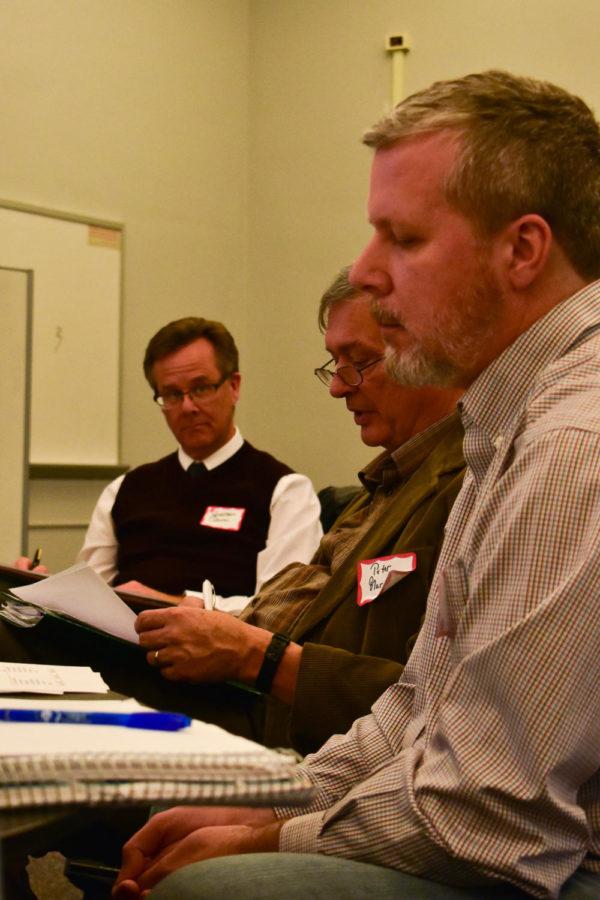- App Content
- App Content / News
- News
- News / Politics And Administration
- News / Politics And Administration / Campus
Campus Climate: Faculty makes recommendations to President Wintersteen
Peter Martin (middle), from the Human Development & Family Studies Department, discusses university initiatives regarding campus climate for faculty. Martin sat next to J Arbuckle (right) from the Sociology Department and Jonathan Sturm from the Music and Theater Department (left) at the campus climate meeting at the Parks Library on Oct. 17.
January 16, 2019
The first campus climate workgroup has developed its actionable recommendations in response to the campus climate survery results.
President Wintersteen charged four teams with developing initiatives to improve the experiences of undergraduate students, graduate students, faculty and merit and professional and scientific employees when the campus climate survey results were released in May. The team representing faculty experiences on campus spent the fall semester identifying faculty concerns of the highest priority and released their results in December.
Through campus climate results, the Collaborative on Academic Careers in Higher Education (COACHE) results, open forums and faculty comments, the Faculty Experience Workgroup team announced the following action items:
-
Creating and promoting the Cy for Civility Culture Shaping Campaign
-
Developing campus wide policies, guidelines and practices against bullying
-
Increasing access to high-quality child care
-
Enhancing departmental interactions among colleagues
-
Becoming inclusive: The Equity, Diversity and Inclusion Initiative.
“The committee was very unanimous that this set of recommendations would be those that benefit the most of the faculty,” said Provost Jonathan Wickert.
Wickert and Senate Faculty President Peter Martin led the workgroup. The two were responsible for recruiting members to the faculty experience workgroup that best represented the university.
One action item highlights a long-standing problem: Affordable, accessible and quality child care services.
“It’s hard to focus on one’s work if one is worried about how to care for one’s child during the day,” Wickert said. “We know that we can have the best faculty when we focus on a healthy work-life balance.”
According to campus climate data, a combined 23 percent of faculty “strongly agreed” or “agreed” that child care benefits at Iowa State are competitive. The three childcare centers on campus have a combined waitlist of 626.
“We are fortunate at ISU that we already provide child care services … but the fact is the demand is greater,” Wickert said. “We want to be as responsive as we can. A great example is seen at the University of Minnesota.”
Martin said resources and culture play a crucial role in promoting a diverse and inclusive climate within the faculty community.
The “becoming inclusive” objective identifies a need to promote a more welcoming climate for underrepresented faculty on campus, and step one calls for increasing resources for underrepresented individuals.
Currently the university’s discrimination and harassment policies do not have any working definitions of bullying. Including such definitions can codify expectations and provide mechanisms for accountability, according to the report.
“If I’ve just been bullied, how am I supposed to stand up in front of a class relaxed, friendly and prepared to teach?” Martin said.
The climate survey results also raised concerns for faculty of color.
“People of color, in general, their responses are a little less rosy,” said Faculty Experience Workgroup member Jose Rosa, faculty fellow for diversity and inclusion. “That is a concern. Why are they [faculty of color] seeing themselves as undervalued?”
According to campus climate results, 83 percent of white respondents felt “very comfortable” or “comfortable” with the overall climate at Iowa State, compared to the 67 percent of respondents of color and the 66 percent of multiracial respondents.
“We need to look for opportunities to empower initiatives that address the isolation these folks are feeling,” Rosa said.
According to campus climate results, 54 percent of faculty respondents had “seriously considered” leaving Iowa State in the past year. The top six reasons respondents considered leaving the university were low salary/pay rate, limited opportunities for advancement, increased workload, inability to effect change, tension with supervisor/manager and lack of sense of belonging.
While low salary/pay rate did not surface as one of the faculty workgroup’s action items, the data raises the question: Can we continue to maintain a high caliber of faculty at Iowa State without further financial investment?
“The fact is 54 percent of the faculty didn’t leave the university,” Wickert said. “Last year we had 37 out of 1400 tenured or tenure eligible [members of faculty] resign and take jobs elsewhere … that is less than 3 percent.”
The future implementation of these recommendations will rest upon the leadership of President Wintersteen.
“Some of these initiatives will be able to move ahead without the need for resources … but other parts will, of course, need more funds,” Martin said. “The bullying issue for instance — we’re talking about policies, you don’t need a lot of resources.”
With their task completed, both Martin and Rosa are optimistic about their work.
“This [meeting challenges] will come as a form of validation,” Rosa said. “We are listening. This wasn’t just an exercise.”
















